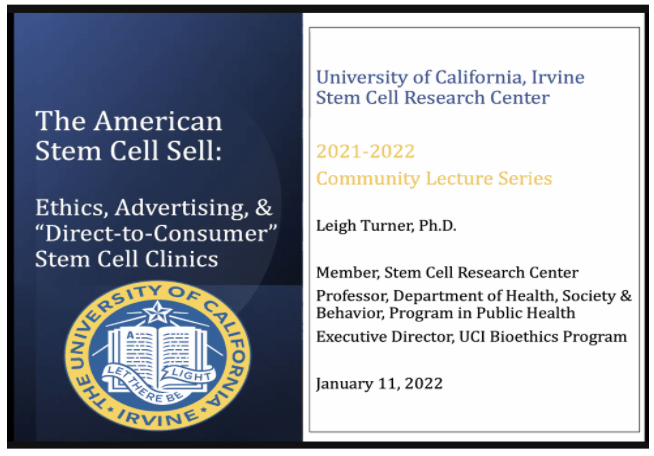The UCI Sue and Bill Gross Stem Cell Research Center welcomed Dr. Leigh Turner, a professor in the Department of Health, Society, and Behavior at UCI, for a virtual webinar on ethics and regenerative medicine clinics on Jan. 11. In this webinar, Turner discussed the existence of unlicensed stem cell treatment clinics and how marketing tactics utilized by these businesses impact individuals who decide to undergo particular treatments in a significant way.
As the first community lecture of 2022, this webinar continues the year-round Community Lecture Series, which consists of webinars that facilitate discussions on topics relating to stem cell research and its applications in medicine.
Dr. Aileen Anderson, the Director of the UCI Sue and Bill Gross Stem Cell Research Center, began the webinar by introducing Turner, who started off his presentation discussing the stem cell clinic marketplace that expands beyond the scope of the United States.
“In the United States, it was assumed that if someone was seeking a purported stem cell treatment that didn’t contain a lot of evidence on its safety and efficacy, that individual would go somewhere else for it,” Turner said. “These cross-border journeys were taking place where Americans were going to other countries like China, India, Mexico, Russia and the Ukraine to receive treatments from jurisdictions that lacked laws regulating such stem cell products.”
Between 2002 and 2009, an emergence of a marketplace similar to those in other countries advertising “legitimate” stem cell-based interventions (SCBIs) had begun in the United States. Turner explained some of the most important influences on many individuals purchasing these treatments, which are not evidence based, to gain insight on the issue from a patient’s perspective.
“We are all vulnerable mortal beings who may have injuries, end up experiencing illness, or die from such. Difficult periods in one’s life like these influence individuals to look for a way in which they can stop feeling like they do,” Turner described. “For many individuals, being surrounded by stem cell hype also makes it challenging to make distinctions between evidence-based [Food and Drug Administration (FDA)-approved] stem cell interventions and stem cell interventions that are not yet backed up by credible evidence on safety and efficacy.”
Although such illegitimate interventions exist, there is some evidence and stem cell-based interventions that have become the standard of care in medicine today. Turner highlighted some of these treatments, in particular those for cancer of the blood and other immunological conditions.
“If we know of someone who received a bone marrow or peripheral stem cell transplant, such treatments have been for cancer of the blood or selective immunological conditions. These illnesses are therefore effectively able to be treated by stem cell-based interventions,” Turner explained.
To lure patients into particular stem-cell based interventions, many of these businesses use tokens of legitimacy, tactics that will make such unlicensed and unproven interventions seem credible to the general population. Turner went on to describe one example of these tactics utilized today.
“A popular token of legitimacy are scientific-seeming marketing claims. A business’ website can have misleading claims where statements cut and pasted from national institutions of health websites are woven into the statement to give a valid reason as to why a particular intervention of theirs is being offered today. This is done even when manufacturers are far from ready to make such a product available,” Turner said.
As the marketplace has been proven to be incredibly persuasive, Turner emphasized the importance of why it matters to be concerned about its emergence. The main concern lies within serious bodily harm a patient can be exposed to.
“When you bring products into the marketplace and start putting them into human beings, you can get serious injuries happening to patients where their occurrences are not that shocking since the products haven’t been carefully tested. Many of the clinicians administering these procedures are well outside the boundary of a particular expertise,” Turner said.
Turner concluded the webinar by describing some of the facilitated responses against stem cell-based intervention clinics, an important one being activities from regulatory bodies such as the FDA. According to Turner however, many organizations have been able to play a significant role in promoting a better regulated U.S. marketplace.
“The FDA has done a good job on clarifying how it interprets and applies laws and regulations. There were a couple of guidance documents that did a nice job of explaining when FDA approval is required or not required for stem cell based interventions in 2017,” Turner said.
To read more about Dr. Leigh Turner’s work on regenerative medicine clinics, the ethics behind them and other stem cell-related research, visit the UCI Sue & Bill Gross Stem Cell Research Center website and Turner’s faculty profile.
Korintia Espinoza is a STEM staff writer for the winter 2022 quarter. She can be reached at korintie@uci.edu.


